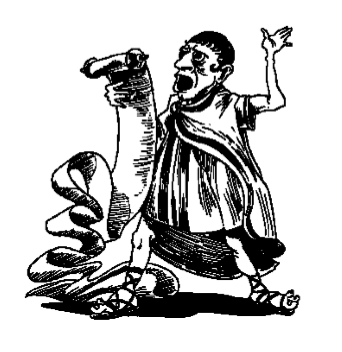Did literary readings contribute to the fall of the Roman Empire? Absolutely, according to the illustrious French historian Jerome Carcopino. The recitatio, or public recitation, was “the curse of literature,” Carcopino rails in his revered opus, Daily Life in Ancient Rome, published in 1939 and still a standard work; literary readings were “a disastrous practice”… a “monster”… an “evil influence”… “a cancer” that ate away at the moral and intellectual fabric of the Empire. This may sound an extreme reaction, at least from someone who never had to sit through a Nuyorican Poetry Slam. But Carcopino is only summarizing the sentiments of Roman authors themselves, who under the early Empire, in the first and second centuries AD, felt crushed by the sheer volume of spoken words.
The satirist Juvenal listed recitationes amongst the health hazards of living in Rome—apart from building collapses, disease, and fires, citizens had to worry about dying from boredom. Other great authors, from Horace to Petronius and Seneca, agreed: Public readings were the plague of the Empire. They occurred in every genre, but poetry was the most insidious. Poets regaled crowds in the forums, during the Games, at dinner parties. Noblemen would corner house guests for all-night verse sessions (an invitation to the holiday villa of Pliny the Younger was a mixed blessing; he liked to read his work in sessions that could last for three days). Romans could hear the amateur outpourings in Athens, Ephesus and Alexandria. Traveling on ships, passengers amused themselves by sharing their literary labors, as did guests around the fire after dark at highway inns.
The most successful Roman writers—who didn’t need to stoop to such shenanigans to trap an audience—viewed the popular phenomenon with disdain. Horace compared an author on a stage to “a leech that will not let go of the skin until it has sucked its fill of blood.” Martial relates the relentless onslaught of one young writer whose reach extended into Rome’s public latrines:
You read to me as I stand, you read to me as I sit,
You read to me as I run, you read to me as I shit.
I flee to the baths; you boom in my ear.
I head for the pool, you won’t let me swim.
I hurry to dinner, you stop me in my tracks.
I arrive at the meal, your words make me gag.
In his Satyricon, Petronius includes a poet who bursts into long declamations in art galleries, colonnades, temples, streets—and is pelted with stones by a discerning public.
Despite such cruel barbs, the majority of Romans obviously took readings seriously. The classic recitatio was an organized event, usually held...
You have reached your article limit
Sign up for a digital subscription and continue reading all new issues, plus our entire archives, for just $1.50/month.
Already a subscriber? Sign in





